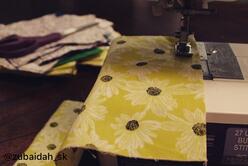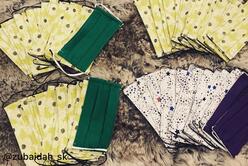Zubaidah bin Ja’Far is an intellectual giant from Islamic history. Compassionate and wise, her position as a princess and devout believer left a legacy that has lasted hundreds of years. In the present, Zubaidah, a former refugee from Iraq living in Salt Lake City, strives to do right by her namesake. “Everybody knows her story,” Zubaidah said. “How she helps people. I want to be like her.” Like her namesake, Zubaidah has a passion for helping people, and she has felt that calling sharply during the pandemic.

“In Iraq, it’s a rare name. If you call my name on the street, nobody else will turn. My name is vintage,” Zubaidah explained. Although Zubaidah earned her bachelor's degree in geography in Jordan, she now runs her own design business. Even as a child she had a penchant for creating. Wanting to be different from other kids and their toys, Zubaidah created unique toys for herself, often crafting them on her own from whatever materials could be found. Even when her mother would begin to throw something away, Zubaidah would interfere, asking her in horror, “What are you doing?” To this day, she still uses recycled materials in her designs.
“I wanted to do something help with coronavirus. I didn’t even know how to use a sewing machine. I wanted to do everything from A to Z,” Zubaidah said. She ordered the fabric she needed and her best friend helped her find elastic for the masks. Her friend, who works at a cancer center, expressed their need for masks so Zubaidah prioritized the center first. With a keen eye for detail, she created high-quality cloth face masks, designing and redesigning to get it just right. The latest and third batch she delivered to the IRC in Salt Lake City for use by newly arriving refugee families.
Before creating masks, Zubaidah had garnered a lot of experience through her evolution as a designer. This journey began when Zubaidah still lived in Jordan and couldn’t find a bracelet in the style she was looking for. “I wanted to create something special, but I could not find it in the stores,” she said. She sketched what she had in mind brought it into a jewelry store. Not only did they create the bracelet for her, they asked to use her design for future products. After that, she began to regularly draw up designs on paper. Last April, through a scholarship, she began to learn how to make jewelry in a studio. “I learned very quick,” she recollected.
Through her design business, Zubaidah SK, run out of her home, Zubaidah sells crocheted items and her personalized jewelry. “The IRC helps me and my family,” Zubaidah said about the beginning of her business. “I asked them to help me with my logo and they connected me to a logo designer, super nice and free of charge,” she said, remembering how the collaborative process eventually led to her “dream logo.”

Zubaidah watches the way that people help each other, as with her experience at the IRC, and always works to do her part to help others. In Jordan, Zubaidah helped people by babysitting when she had the chance. During this time, she thought “maybe in the future, I will need help.” When she arrived in the United States, this proved to be true. She noted that caseworkers at the IRC in Salt Lake City helped her whenever she needed it. She reflected on how one caseworker even took her to the hospital in the middle of the night once. Zubaidah held onto that experience: “It was very meaningful to me.” To her, providing cloth face masks is “something very simple to say thank you.”
“As a refugee, you don’t start from zero,” Zubaidah said. “You start from below zero. We had a normal life, normal family, but then war happens.” She encourages everybody to understand the challenges refugees face since they have grown up with a different language and culture. “Don’t be upset with him,” she counseled. “He’s fighting with his life, with himself.”
Zubaidah wants to help people like herself who are rebuilding a life in the United States, and she is grateful to do just that through her business. “I like that here in America, they support people who have a dream. Because of the IRC, I’m now a designer. I promised myself when my business grows up, I will help the IRC as much as I can, my lovely IRC.” She is keeping that promise.
Consider following Zubaidah’s gracious example: help the IRC in Salt Lake City support vulnerable families in our community as they work to rebuild their lives in Utah. Join our efforts by making a gift in support of our work. Give today>